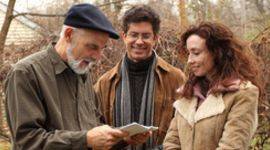When I first moved here over a dozen years ago, I had a few expectations: that the culture would be more diverse and complex, and thus, closer to my liking; that there would be more opportunities to enjoy the arts; that those opportunities would be of a high caliber and the venues more competitive than the venues I had previously experienced; and that my life would be richer and better for it. The funny thing about expectations is they eventually become an emotional funhouse mirror, and the pleasures you seek are far more complex and elusive than you’d ever expect. I have seen a lot of rich culture in Champaign-Urbana and have indeed met a broadly diverse group of people who have each made my life richer by their presence in it. I have worked my way into the theatrical circles of these cities and have been blessed to enjoy some degree of success with various contributions. I have even made some furtive steps into the writers’ world through my involvement with both this publication and my theatrical writings. It’s been a good and surprising journey, though not one for everybody. Diversity and tolerance of choices that differ from the normative culture are a constant challenge in the Midwest. This conflict has become the subject of a film being produced in the Champaign-Urbana area this spring.
The Garden of Chloe is a film about coming home and making peace with the current life one chooses to live in the face of one’s past life and the scrutiny of one’s family and friends. The film, currently being produced in and around Champaign-Urbana, is a very personal project of writer/director Johnny Robinson. The website for the in-progress project states that the film focuses upon, “A middle-aged, free-spirited performance arts teacher [who] moves with her companions to the small town and [the] house of her childhood. [The group of companions] eclectic, bohemian world does not fit the suburban community, [and] soon Chloe’s family and neighbors become contentious about her lifestyle, triggering her phobias of public disclosure and performance. Chloe’s hopes for the future become threatened” as the action builds.
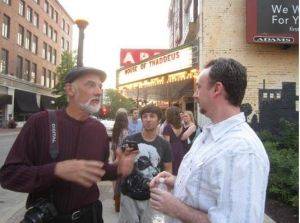 This is a film that defies easy genre-labeling with both comedic and dramatic elements in its interesting and unique narrative. The filmmaker, Johnny Robinson (pictured at right with actor Matt Hester), began his craft in San Francisco after earning undergraduate and MFA degrees from Syracuse University, later moving to C-U in 2009 and joining the Dreamscape Cinema. On the film’s website, Robinson states, “As a personal indie film, The Garden of Chloe diverges from the conventional wisdom about the content of movies. This film disregards popular cynicism by depicting people who have the ability to learn and grow. It ignores the axiom that a movie must support broad community values, instead illustrating an alternate valid morality. The movie approaches the topic of Chloe’s lifestyle from a prospective that no other movie I have found approaches it.”
This is a film that defies easy genre-labeling with both comedic and dramatic elements in its interesting and unique narrative. The filmmaker, Johnny Robinson (pictured at right with actor Matt Hester), began his craft in San Francisco after earning undergraduate and MFA degrees from Syracuse University, later moving to C-U in 2009 and joining the Dreamscape Cinema. On the film’s website, Robinson states, “As a personal indie film, The Garden of Chloe diverges from the conventional wisdom about the content of movies. This film disregards popular cynicism by depicting people who have the ability to learn and grow. It ignores the axiom that a movie must support broad community values, instead illustrating an alternate valid morality. The movie approaches the topic of Chloe’s lifestyle from a prospective that no other movie I have found approaches it.”
The film stars a mix of professional and local actors in principal roles. The titular character is played by Chicago actor Kelly Lynn Hogan. Also from the Chicago area is professional actor Scott West. The two are joined by C-U area actors Chris Clevidence Taber and Matt Hester, as well as Decatur’s, Anne Thompson. I took a moment to email chat with the director and actors Taber and Hester about the experience of filming in the Champaign-Urbana area. I first asked Johnny about his project.
Smile Politely: What attracted you to filming this script? What elements of the story attracted you to its telling?
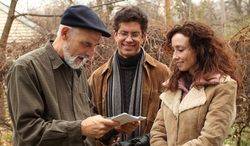 Johnny Robinson: I wrote the script. It is an auteur film, as opposed to a genre film. I am interested in realistic drama that illuminates life. I do not have a thesis or message, only the desire to tell stories I don’t see being told elsewhere. I can best write about what I know. Although nothing in the story is completely autobiographical, it all comes from direct experience of myself or people in my life. What is it like to feel you have choice between being authentic and being accepted? Artists often know this first hand. I am also fascinated with the benefits of trust. With enough trust and communication, interactions happen between people that much of the world does not believe is possible. Experienced adults can reclaim innocence, or something like it. All this takes tremendous courage.
Johnny Robinson: I wrote the script. It is an auteur film, as opposed to a genre film. I am interested in realistic drama that illuminates life. I do not have a thesis or message, only the desire to tell stories I don’t see being told elsewhere. I can best write about what I know. Although nothing in the story is completely autobiographical, it all comes from direct experience of myself or people in my life. What is it like to feel you have choice between being authentic and being accepted? Artists often know this first hand. I am also fascinated with the benefits of trust. With enough trust and communication, interactions happen between people that much of the world does not believe is possible. Experienced adults can reclaim innocence, or something like it. All this takes tremendous courage.
SP: Filming in Central Illinois has its rewards and challenges. What have been the benefits of filming this locally and the obstacles you’ve had to overcome?
Robinson: There is a great filmmaking and acting community here. Every year the skill level is better, the experience they all have with each other increases. We have actors who hold their own with the union actors imported from the big city. I would say the main limitation is simply size. I had to cast a couple of major characters from out of town because there’re just aren’t enough around here for all the variety we need.
The kind of film I am making is different inherently from the big 3 cities. By not having investors and a commercial distribution model, I have complete control over the content. Most of my cast and crew have day jobs, so I am shooting on weekends. This clashes with union talent from Chicago who want to shoot during the week. However many of the out-of-town actors were attracted to the script, precisely because a script like this is not fermented in a profit-making model.
SP: As you mentioned, we have a wealth of actors in the C-U area. What attracted you to the actors you’ve used, and what advice would you give future actors auditioning for films on the local scene?
Robinson: Our community of actors come primarily from theatre. Some have learned the difference between stage and screen acting, but many are still acquiring that awareness. That is important to learn. Of course the basis of acting is the same and as I said, we have wonderful actors here. The main thing I would say to local actors is “Don’t believe you are limited.” With enough thought and focus, we can do work here that is as good as anyone can do anywhere. History is full of examples where great works came out of “nowhere.”
I don’t have any unique plans for [the film.] A local premiere, getting into film festivals, obtaining online distribution, getting it seen by as many people as possible. I have made several shorts in the past that paid for themselves in DVD sales. It’s a different world now. Online streaming has not yet evolved into a good enough resource to reward independent filmmakers. We need it to.
********
On the local front of this project, I have worked with both Chris Taber and Matt Hester through The Station Theatre is Urbana. Chris is sort of my muse. I met her when we both appeared in a summer production at EIU, and then we reconnected when she moved back to the area shortly before I began directing Parkland College Theatre’s production of Angels in America: Millennium Approaches. Since then, Chris and I have worked on various productions in various capacities, including Parkland’s productions of Laughing Stock, Lend Me a Tenor, and Dead Man’s Cell Phone, and The Station’s productions of The Little Dog Laughed, 8: the Play, How I Learned to Drive, Sons of Prophet, and this winter’s Good Boys and True. In my very biased opinion, Taber is a multitalented actress and just a great gal who also contributes to our future theatre and film communities by teaching drama in Champaign. I met Matt Hester, who comes to this production from the Danville area, when I was costuming The Station’s production of Sons of Prophet last season. He, too, has impressed me with his versatility and range. I interviewed the pair on the rewards and struggles of juggling acting and another career, and their thoughts on Garden of Chloe.
SP: What is your character in the film and what is the biggest challenge of creating this character?
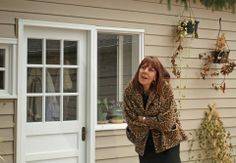 Chris Taber: My character is Ginny, Chloe’s sister. She has carved out what seems to be a perfect existence in the small town in which she and Chloe grew up. She’s happy with the status quo, and with her place in the town’s social circle. She has the perfect house, a perfect group of friends, a perfect husband. Or does she? Through Chloe’s return home, Ginny begins to question her “idyllic” small-town life. She reveals some long-held secrets and seems to long for Chloe’s carefree world-view.
Chris Taber: My character is Ginny, Chloe’s sister. She has carved out what seems to be a perfect existence in the small town in which she and Chloe grew up. She’s happy with the status quo, and with her place in the town’s social circle. She has the perfect house, a perfect group of friends, a perfect husband. Or does she? Through Chloe’s return home, Ginny begins to question her “idyllic” small-town life. She reveals some long-held secrets and seems to long for Chloe’s carefree world-view.
I think we can all relate to Ginny’s desire to “fit in,” to not rock the boat. We all have secrets. The challenge of the role is to understand Ginny’s final decisions in the story. It’s not necessarily one a lot of people will be able to side with. I want to be real in my work with Ginny so that at least the audience can understand her choices, if not agree with them.
Matt Hester: I’m playing Jessie. I’m part of the “love triangle,” so to speak. I would have to say that the most challenging part to creating this character has been the fact that he is very similar to me in many respects. He’s also very different in ways, but I can relate to him quite well. Playing a completely different type of character than yourself is easier, I think, because you can get “lost” in this other identity. When it hits close to home, at times, it’s hard to separate the self from the character. That’s when you really have to dig deep into the characters background and re-create yourself in “their” image and not your own.
SP: From your point of view, what is the most interesting part of this project?
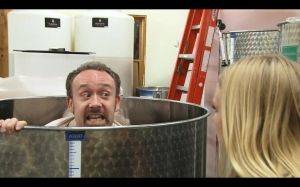 Hester: For me, the interesting part of this project has simply been the fact that it is a feature length film. I’ve done live theatre my whole life and am very comfortable in that atmosphere. However, film is a whole other beast entirely. I’ve done some smaller film work, but nothing on this scale. Learning to work in this new environment has been fun and challenging.
Hester: For me, the interesting part of this project has simply been the fact that it is a feature length film. I’ve done live theatre my whole life and am very comfortable in that atmosphere. However, film is a whole other beast entirely. I’ve done some smaller film work, but nothing on this scale. Learning to work in this new environment has been fun and challenging.
Taber: I find working in film fascinating unto itself! It’s such a huge departure from the way live theatre works. There is no weeks-long rehearsal time; you show up on set and GO! I always feel that on about the 4th or 5th take I’m finally “getting it right!” But on the other side of that, you get to try each scene several times before it becomes the performance that others will see. I also am amazed by how much work goes on behind-the-scenes! The crew works about twice as hard as the actors. I’ve learned so much about the nuts and bolts of making a film. Very interesting stuff!
SP: Since acting is not your day job, what is the biggest challenge of balancing your “reel” life with your “real” life?
Taber: How clever of you, Thom! People who know I’m working on this film will say to me, “So how was the filming? When does it come out? You’re done, right?” They aren’t aware of how long it takes! Of course, that’s primarily because most of us making this film have “real” jobs outside of the world of movie making! We’ve only been filming on the weekends. This schedule has been great in balancing my “real” job with this “reel” job, but it’s been hard on my personal and family life. I miss out on a lot of weekend time with my kids and husband. Luckily, they’re all fantastic supporters of my crazy acting life!
Hester: Honestly, with this project, it hasn’t been too difficult. We film on weekends only. Actors are only called if they are in a scene that day. It has actually been easier than when I’m in a theatre production. All the prep, rehearsal, and “production” for a scene are done in the same day. Once they have the shot, it’s done for the actors. Aside from that, I still try to maintain a respectful balance with my family. When I’m home, I’m home. I’m there for them. I try to keep my “reel” life to the shooting days.
********
To learn more about this exciting local film project, check out their website. And look forward to more information on the project—including potential screenings—in the near future on Smile Politely








